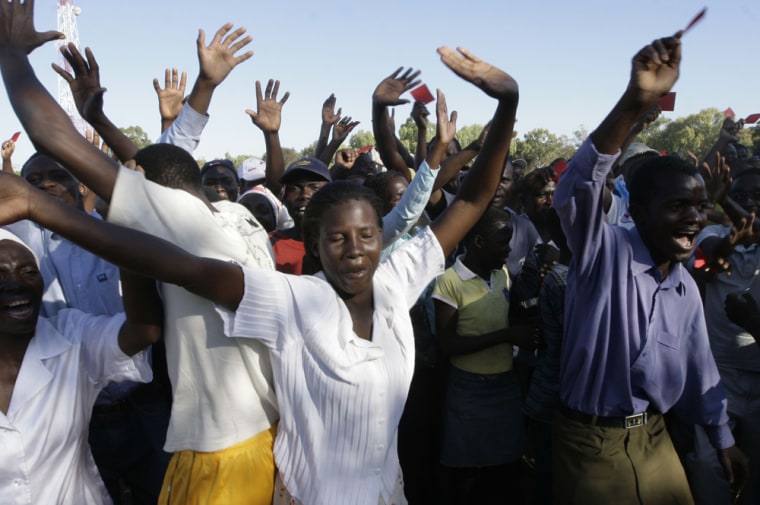Ruling party militants prevented the opposition from holding a rally in a Harare suburb Sunday, while police attacked supporters in Bulawayo and stopped them from putting up election campaign posters, party officials said.
However, two other gatherings went ahead as planned in Harare despite militants threatening and intimidating supporters at the venue, Movement for Democratic Change spokesman Nelson Chamisa said.
"The people are so strong and so courageous. It was very successful," he said.
A court had struck down an indefinite police ban on opposition rallies Saturday.
Movement for Democratic Change leader Morgan Tsvangirai faces off against President Robert Mugabe in a runoff set for June 27. Tsvangirai won the most votes in the first round in March, but not enough to avoid a runoff.
Opposition members intimidated, killed
Independent human rights groups say opposition supporters have been beaten and killed by government and ruling party thugs to ensure the 84-year-old Mugabe, in power since independence from Britain in 1980, wins the second round.
The opposition says at least 60 of its supporters have been slain in the past two months. Tsvangirai, who has been the target of at least three assassination attempts, left Zimbabwe after the March vote but returned in late May to campaign for the runoff.
On Sunday, Tsvangirai was in Bulawayo, Zimbabwe's second largest city, and also made a surprise visit to a small rally in Kwekwe, where he urged supporters to go and vote, the party said in a statement.
"The people have already won. The coming election would only reaffirm this victory," Tsvangirai said. "Zimbabweans would resoundingly defeat the regime and begin a new life with hope of a better Zimbabwe."
In Bulawayo, the opposition said that police attacked supporters and prevented them from putting up election campaign posters.
A team of four party members was putting up posters when they were confronted by police and other security forces who told them that "it was Mugabe's country and only Mugabe could put posters on street poles and the MDC would not be allowed," the opposition said in a statement.
The team continued on to the railway station, but were followed by police in riot gear and on bicycles. The police assaulted the MDC members with baton sticks; one person suffered a broken leg and was admitted to a hospital, the party said.
Comment from the police was not immediately available.
Zimbabwe now a 'police state'
Tsvangirai's spokesman, George Sibotshiwe, said Mugabe has turned Zimbabwe into a police state.
"The regime is denying the people their fundamental rights in order to steal the June 27 election and subvert the will of the Zimbabwean people through widespread violence and killings, wanton arrests and by closing political space for the MDC to campaign," he said.
Also Sunday, a court ordered police to release opposition lawmaker Eric Matinenga, who was taken from his home Saturday and detained at a station outside the capital. He was accused of fomenting violence, lawyer Beatrice Mtetwa said.
Matinenga, also detained on similar charges earlier in the week but released because of a lack of evidence, is among scores of opposition activists arrested in recent weeks. Matinenga, himself an attorney, has represented opposition leaders in a string of high-profile court cases.
Mugabe was lauded early in his rule for campaigning for racial reconciliation and building the economy. But in recent years, he has been accused of holding onto power through fraud and intimidation, and trampling on political and human rights.
Zimbabwe's collapsing economy was a major concern of voters during the first round of voting. People are going hungry in what was once the region's breadbasket, with the world's highest inflation rate putting staples out of reach.
Zimbabwe's economic decline has been blamed on the collapse of the key agriculture sector after the seizures — often violent and at Mugabe's orders — of farmland from whites. Mugabe claimed the seizures begun in 2002 were to benefit poor blacks, but many of the farms went to his loyalists.
